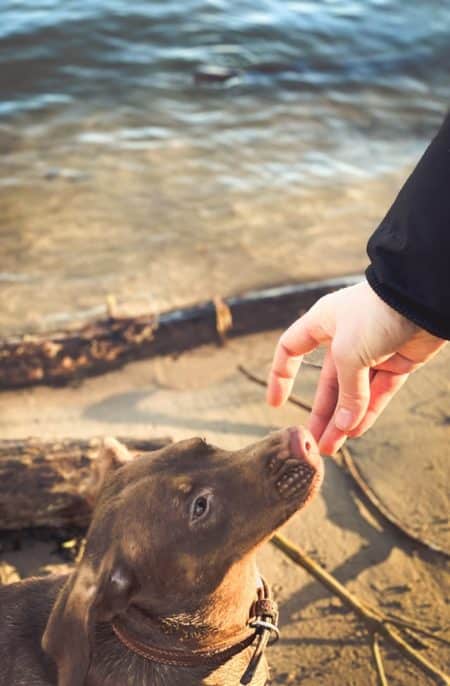Can a labrador be a guard dog? Many people select Labradors as pets for various reasons. They are loyal and loving dogs. All that Labs does is ensure everything it does is right for you.
Ideally, it will do what you say because he loves you. Though this character may seem normal to you, it’s not normal for all breeds.
Labradors tend to be highly protective of your home. You may have noticed Labrador behaves like a guard dog because of its loyalty and protective nature over other dog breeds.
But, can a labrador be a guard dog?
A Labrador may not be the best alternative for a guard dog. It does not have the temperament necessary to protect your home.
Besides, they tend to be intelligent and loyal; you can train them naturally; they are not threatening.
The Root of Labradors Behavior

- Bred to be loyal dogs
- Bred to work as a guide dog in law enforcement
- Trained as puppies
What Type of Dog is Labrador?
Labrador is generally sociable, friendly, and somehow mischievous. They remain a firm favorite in homes with children because of their temperament.
Also, there are several good reasons why Labrador remains a popular dog breed in the US according to statistics.
- Labs are genuinely straightforward to care for, making them ideal first-time pets. They will remain happy as long as you feed them good food, create a space to exercise and have fun, and somewhere comfortable to sleep.
- It’s a dog that thrives on attention and has lots of energy that comes in handy while trying to encourage your children to exercise. Typically, they are well-behaved and usually don’t get spooked easily. However, if provoked enough, they can lash out.
Essential traits of a guard dog
According to a study conducted, the essential attributes of a guard dog are high attentiveness, aggressiveness, fast mobility, trustworthiness, intelligence, and high activity level.
For instance, a dog can be too aggressive towards strangers, making them a good guard dog, at least in their mindset.
However, it can be too aggressive but too small to be a perfect guard dog. Meaning it won’t be able to stop any threats in your home.
Other crucial traits of a guard dog include size and strength.
So, where do Labradors fit? Are Labs good guard dogs?
Can a Labrador be a Guard Dog?

Before answering, “are labs good guard dogs” let us look at what makes them not good or bad guard dogs.
There are multiple reasons why Labrador is not used as a guard dog. Perhaps labs have a low level of aggression.
Many guard dogs are bred to guard livestock or property. As we had seen earlier on the roots of Labrador’s behavior, the labs were not.
Labs were bred to be a retrieving and flush dogs. Meaning their job is to scare preys out of hiding and retrieve.
Ideally, they flush pets rather than hunt them. This has made them very unaggressive. So, should we categorize it as a guard dog or a watchdog?
Is Labrador Retriever a Guard Dog or Watchdog?
Labrador will not make a good guard dog. However, it can make a good watchdog if appropriately trained.
Some of the common situations where Labs are commonly used as watchdogs are;
- Drug detection
- Explosives detection
- Trained as guide dogs
Back to our question, “can a labrador be a good guard dog?”. The answer is not really. They have been bred to be friendly, unaggressive, and slow to bite. Such traits do not apply to guard dogs.
Are Labradors protective?
Yes, Labradors are protective in that they defend their family members and defend themselves, and their territory. Labradors respond according to how they are treated.
It might have the protection instinct in mind if you are kind to it, and it will naturally love to protect you.
It is because of their loyalty and intelligence that makes them excellent rescue dogs and diving rescue dogs.
Ideally, Labrador Retrievers are not considered protective as traditional guarding breeds are. Labs may try to protect your home from things they find/ view as a threat.
Domestic dogs identify humans and other dogs in the household as members of their family “pack.” All dog breeds have protective behavior.
These behaviors begin during adolescence when the dog reaches social maturity. For instance, if a new kid joins your household, it will increase protective behavior.
Protective behavior reflects how a dog feels about unfamiliar animals and people. However, Labrador Retrievers do not belong to the cluster of dog breeds known to have strong protective instincts.
Characteristics that make Labs protective dogs
- Bred due to their bond to people, friendliness, trainability, and good-natured temperaments
- They are even-tempered, intelligent, and very friendly
- Protective of their pack and respond with growling, barking, or raised fur hackle to incase it senses something dangerous.
Can you train a Lab to be a guard dog?
It’s not always possible to train a Labrador to guard because it doesn’t have the necessary temperament for a guard dog.
Looking at the behavioral response, we cannot always consider what is in its DNA that creates and drives its personality.
With that said, if your Labrador likes visitors and wags its tail when his friends come over and then don’t train him as a guard dog.
However, you can get him on track again with proper care and basic obedience training. Though Labs can be trained to be a guard, they are not naturally threatening.
It is more suited for a loving family pet role, and it can be a mistake if you try to modify its natural docile behavior.
How to Make Labrador Guard Dog

As discussed earlier, labs are not the best choice if you are looking for a dog with the technical definition of guard dogs: attacking command.
Still, you can train your Lab how to engage its protective instincts. Also, reward them for being a great watchdog and alerting you.
The individual personality of your dog affects how it takes its job as a family watchdog, but;
- You can reward them for performing duties that you are encouraging.
- Reward your Lab for alerting you to what they detect in the environment, like someone on your property, at the door, or anything else.
- Do not punish or scold your Labrador for barking when your doorbell rings or alerting you to any sounds they seem concerned about.
- If you want it to be a great dog, do not praise them excessively, but don’t give a negative association while they try to protect you.
- If you scold them repeatedly for alerting you, they will become fearful when trying to respond. They are less likely to alert you again.
Read Also: Can Dobermans Be Hunting Dogs
Why is my Labrador becoming aggressive?
Labs are known for not being aggressive. Their personalities are associated with being friendly, patient, and laid back.
But, it can become aggressive for several environmental or medical reasons: Frustration, illness, fear, and evolutionary development.
Some of the medical conditions that are known to make dogs aggressive include neurological problems, thyroid disorders, seizures, and brain tumors.
Fear tends to be the root of aggressive behavior in labs. Fear of a person or a dog approaching; fear of the consequences and their safety; fear of losing something they have; and the fear of getting hurt.
Read Also: Do Newfoundland Dogs Shed
Final Thought
It is pretty clear Labs do not make a good guard dog. Apart from being unaggressive, they are not possessive and easily make friends.
Their happy temperaments, playful nature, and friendly personalities make them good family members.
If you need a perfect guard dog for your home, there are various options available that you don’t need to struggle with training a lab dog to be your guard dog.
You can opt for breeds like Mastiff, German Sheppard, Rottweiler, and Doberman pinscher.
Better still, you can let your lab dog remain a watchdog. However, it all depends on how much training and your dog’s temperament.
Read Next: Can Dogs Eat Mackerel